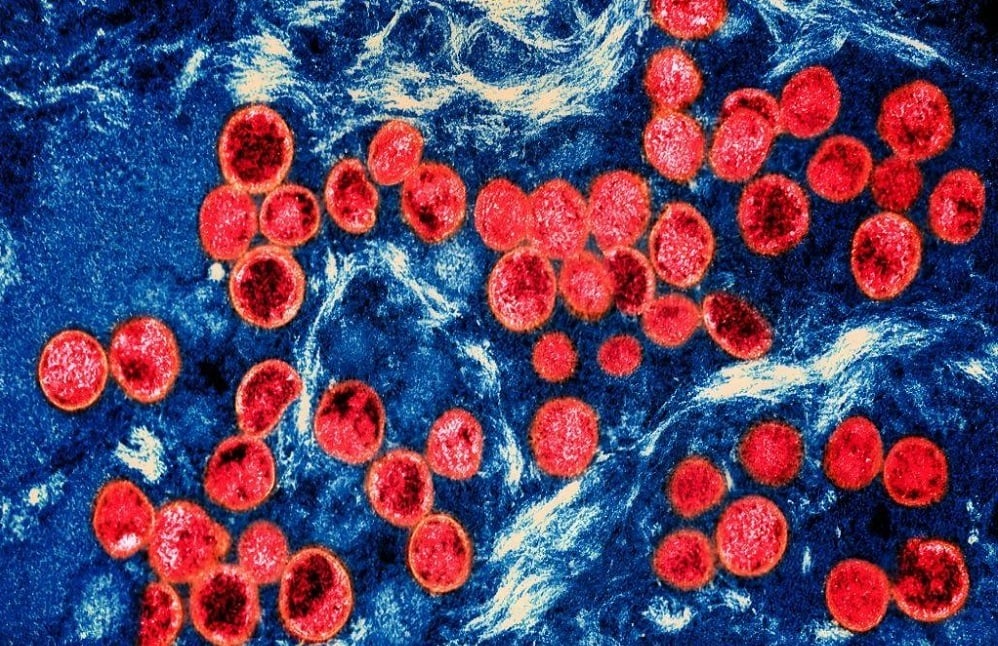Colourised transmission electron micrograph of mpox virus particles (red) found within an infected cell (blue) cultured in the laboratory. (NIH-NIAID/IMAGE POINT FR/BSIP/Universal Images Group via Getty Images) The DRC eradicated smallpox in 1971 and for decades to come the vaccines also worked in mpox cases. Mpox vaccines are expected next week as Japan, Belgium and the US pledge supplies.
Humanitarian organisations say the conflict in the country's North Kivu province is hindering their work to contain mpox. In 1971, the Democratic Republic of Congo (DRC) eradicated smallpox in what was one of most remarkable accomplishments of the 20th century. The system built to deal with smallpox would later be the buffer for mpox when human cases were detected because those vaccinated against smallpox were equally protected against mpox.

Over the years, there have been fewer people protected against smallpox and with the younger population vulnerable, mpox found a breeding ground. In a televised press briefing, DRC Health Minister Samuel Roger Kamba Mulamba explained the context and history around the mpox outbreak. "Smallpox was eradicated by the vaccine, finished! In the early 1970s, 1980s and late 1990s there were still people vaccinated against smallpox.
"So, when mpox had an outbreak they were still protected by the same vaccine. "The problem is that there are fewer people born before 1980, which means young people are not protected by the old vaccination. "This explains that people are not protected from being contaminated," said Mulamba.
READ | Mpox outbreak in Africa was neglected, and could now turn into the next global pandemic Since the beginning of the year, 16 000 cases of mpox and 537 deaths were recorded in the DRC. To expand its operations in the country, which is currently experiencing financial shortages due to crises related to continuous conflict and severe disease epidemics, UNICEF has requested almost R85.5 million.
Mpox has spread to neighbouring countries and UNICEF requires a further R19 million for regional preparedness, coordination and response efforts. Jambo Lab, a web-based platform with AI and an SMS system for humanitarian work in the DRC, has launched an SMS programme directed at affected communities. "Members of local communities subscribe to our digital platform and receive SMS alerts in the local language with essential information on mpox and preventive measures to reduce the risks of contamination," the organisation said.
Help on the way Mulamba said Belgium was set to supply 215 000 vaccines, while Japan, one of the major mpox vaccine manufacturers through KM Biologics, pledged three million doses. The US through its donor arm, USAID, has not said how many will come through. READ | Mpox 'not the new Covid', says WHO as cases surge Gavi, the Vaccine Alliance, also promised to make vaccines available to all countries affected globally through a R9.
5 billion fund. The first batch is expected to arrive in the DRC next week. "We will have vaccines arriving next week," Mulamba said in French, addressing journalists in a televised conference in Kinshasa.
Conflict Hayley MacGregor , a research fellow at the Institute of Development Studies in the UK, added the outbreak in the DRC was a "sober example of the challenges to humanitarian responses during conflict, insecurity, displacement, and poor access to healthcare". Since the re-emergence of the M23 rebels in 2022, the conflict situation in the DRC has become worse, with 7.2 million people internally displaced.
Whenever there are armed clashes, people are displaced with most running to refugee camps. The war in the east collapsed what was already fragile health system in North Kivu. READ | Health department confirms control over mpox outbreak The national army of the DRC with its allies, including the SADC force in DRC led by South Africa, have been trying to keep the rebels away from Goma.
There was a mini ceasefire agreed upon in Luanda, Angola, last week. However, there are reports that from Saturday on there were clashes between M23 and the Wazalendo in Katwa on the Kirumba-kikuvo-Kamandi axis. But the International Rescue Committee (IRC) is one of those taking advantage of the Luanda mini ceasefire as a window of opportunity to deal with the outbreak.
"Humanitarian actors are struggling to control the outbreak due to insufficient resources. "Currently, many displaced persons and communities in Goma, who are already struggling without necessities, are exposed to high risks of disease, with children and young people being particularly vulnerable. "The international community must seize the opportunity presented by the recent humanitarian truce and ceasefire signed on July 30 in Luanda, Angola, to act swiftly," said Heather Kerr, the IRC's country director in the DRC.
The IRC intends to deal with mpox in three refugee camps. "The IRC is preparing to launch a response against mpox in North Kivu province, specifically targeting the internally displaced person camps of Bulengo, Rusayo2, and Nzulo, located around the city of Goma. "The overcrowding, lack of hygiene facilities and basic infrastructure expose this population to a high risk of the epidemic spreading," said Kerr.
The News24 Africa Desk is supported by the Hanns Seidel Foundation. The stories produced through the Africa Desk and the opinions and statements that may be contained herein do not reflect those of the Hanns Seidel Foundation. We live in a world where facts and fiction get blurred Who we choose to trust can have a profound impact on our lives.
Join thousands of devoted South Africans who look to News24 to bring them news they can trust every day. As we celebrate 25 years, become a News24 subscriber as we strive to keep you informed, inspired and empowered. Join News24 today Related Links SA-led army in DRC gets UN Security Council support Sweden confirms first case of mpox, also first outside Africa Health department confirms control over mpox outbreak.


















